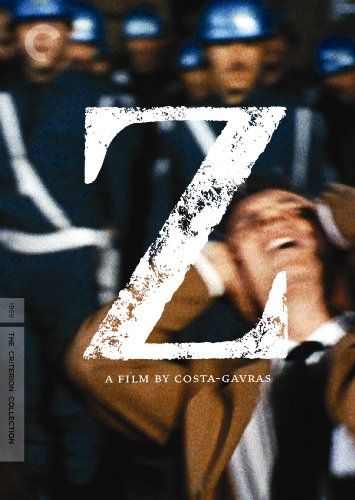Costa-Gavras's Z is the ultimate political thriller. Much like the earlier Battle of Algiers (1968) it takes a real event, and uses it as fodder for cinema. And as a paranoia piece, 1969's Z is a masterpiece. It's an angry film, spurned by the events of 1963, where a Greek politician was assassinated, and was murdered partly by the police, and the regime at the time. It's a film that can make you angry about events of nearly a half century ago, and yet the echoes of the actions are still resonant. My review after the jump.
The leftist politician at the center of the film is called The Doctor (Yves Montand), and he's brought in to have a political rally, but the organizers are denied their first location, and locals in with a half gang/half political organization - that hates the leftists and typifies them as commies - breaks up organizers when they hand out pamphlets. The gang is brutal in their attacks on the street people. When The Doctor comes in everyone's nerves are on edge, and Gravas makes you feel how panicky everything is. It's a masterpiece of tension. Then the night of the speech, violence breaks out with one of the organizers, who's mistakenly grabbed by those thinking he is the Doctor. But even with the police barricading the area, a truck gets through and someone is able to club The Doctor, who goes into a coma.
Essentially brain dead, a reporter tries to help put the pieces together, but the government is working against him, as witnesses are assaulted, and everything that can get in the way does. Only one bureaucrat (Jean-Louis Trintignant) offers to help prosecute those responsible. Z likely works as well today as it did then, and plays both to the times and the assassinations that changed the landscape in Greece, as the ones that were felt stateside. Of course, what makes the film work is that there was a conspiracy that had higher ramifications (even if the men who perpetrated it were thugs), but Gavras has the power of the facts of the case on his side, and films like this are invariably better when they are presenting what the filmmakers see as the truth of the situation. In that way it's a more concrete film than Oliver Stone's equally fascinating JFK, which owes a debt to this. But Stone did not have the through-line that Gavras got with his film.
The director talks on the supplements about how he always thinks about how the film should be entertainment first, and that shows too. He's a filmmaker, and he uses the techniques of cinema to deliver his message. It's a good lesson for anyone with a political bent interested in cinema to take. If you want these films to work, you have to conceive of them in genre terms. There is some level a film like this is dangerous, and it's meant to be. On that level there is something about it that makes me a bit uncomfortable. But I will settle for such a pure and gripping piece of filmmaking.
The Criterion collection presents the film on Standard Def in anamorphic widescreen (1.66:1) and in 2.0 French Mono. For a single disc, there's a lot of extra material here, and it's all rather great. First up is a commentary with Peter Cowie. The man knows his stuff, and this film, and he offers great analysis of the film, and its place in history, and the characters created and their real life counterparts. There's a new interview with the director Costa-Garvas (20 min.), and a new interview with cinematographer Raoul Coutard (11 min.). Coutard was one of the key players in the French new wave, and his approach to the making of the film showcases a master. Then there's period interviews with the author of the book Z, Vassilis Vassilikos (10 min.), with Costa Gavras, Yves Montand, actors Irene Papas, Jacques Perrin, and Jena-Louis Trintignant (5 min.) and then another interview with Costa-Gavras, Perrin, and actor Pierre Dux (4 min.) Also included is the film's theatrical trailer, and a booklet with an essay by Armond White.


.jpg)

.jpg)